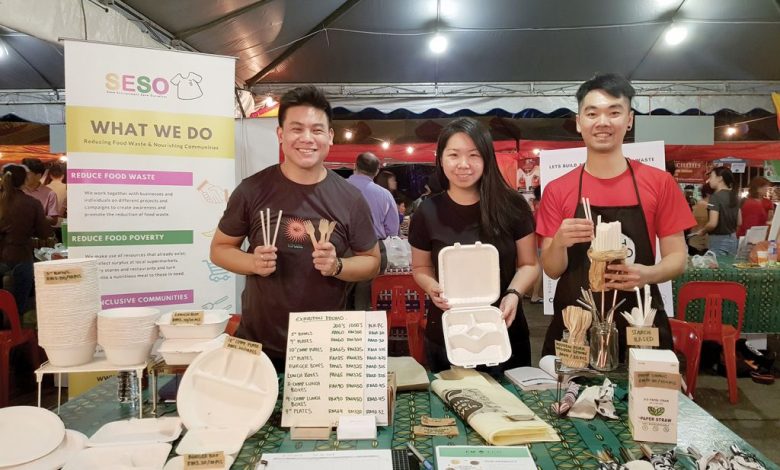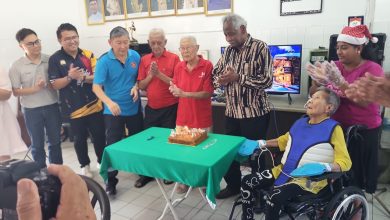

By Tan Mei Kuan
Living in a food paradise touted as the culinary capital by many, one might be oblivious to the fact that the food and beverage industry has a big carbon footprint in view of the high demand. Ipoh Echo zooms in on takeaway packaging in which plastic and polystyrene are so prolifically utilised – how to minimise use or omit it altogether? Plus, the switch to eco-food and drinks packaging and utensils whether it is biodegradable or reusable. What about food waste? Pioneers of green initiatives in the field encompassing local NGOs, F&B establishments and authorities share their thoughts. Let’s all eat our way to a better world!
Eating Our Way to a Better World
Organisations
Established in 2018, CM ECO is an entity which distributes, among others, sugarcane-based food packaging which is biodegradable and compostable, and starch-based and wooden-based cutlery which is biodegradable.
The sugarcane-based food packaging is 100% natural, harmless if consumed by animals, becomes fertiliser after degrading, microwave and freezer safe, can withstand heat up to 140°C and cooling down to -5°C, water and oil resistant.


Both the sugarcane and starch-based/wood-based products degrade completely into the ground from 180 days and below, varying depending on the size of the product, from lunchboxes to straws.
Plus, CM ECO carries stainless steel reusable straws as part of their reusable range of products and is constantly looking for other biodegradable products to be added to their current portfolio.
Vernon Foo Wui Cheon, Founder cum Chief Executive Officer of CM ECO explained, “Not long ago, it was the one picture that everyone knows, the turtle with the straw stuck in its nose. Recently, a sperm whale was found dead in Italy with traces of plastic waste in its stomach. It becomes quite apparent that plastic not only affects our environment but also our food chain. Take microplastics, for example, traces of microplastics are found in baby fishes, who within the food chain get eaten by bigger fishes, and subsequently, are captured and served onto the human diet. It is a full circle that impacts us directly.”


CM ECO caters to both business clients (caterers, restaurants, cafes and even street market vendors) and end users (common folk) for personal use at home and for parties. “Our prices are average, a simple comparison would be the plastic compartmentalised lunchbox, which sells for about RM1 per piece, whereas our sugarcane-based compartmentalised lunch box is about half that of its plastic counterpart,” Vernon pointed out.


According to him, everyone can play a part, no matter big or small, in bringing about an inevitable change that is coming. “Why not ride high with the wave and come out ahead. Our neighbour like Indonesia have chosen to focus on paper-based packaging over a decade ago and is now a zero-waste hub, which also includes Singapore,” he added.
For more details, swing by their Facebook (CM ECO MY) or Instagram (@cm.eco) or email to contact.chunkymonkeys@gmail.com.


Dr Kamaruddin Yaakob Chairman of KOHIJAU (Koperasi Alam Hijau Perak Berhad) and Head of Postgraduate Department of Sultan Azlan Shah University said, “KOHIJAU encourages the use of eco-food and drink packaging and avoids the use of plastic. We suggest that the government should provide subsidy to the producers of eco products so that its price can be further reduced which in turn encourage the community to make the switch. Besides that, mass recycling campaigns should be intensified monthly in collaboration with the major malls in Ipoh to increase the community awareness on the use of eco utensils and not let the rubbish bins overflow with plastic food containers. There should be more recycling billboards which the bigger companies should sponsor. Education should start at home by parents and then nurture in school.”
Major malls with recycling programmes in the pipeline are encouraged to contact the NGO as it provides recycling bins to be placed in the mall and collects when full. KOHIJAU also participates in the Ipoh Car Free Day every month with an informative booth. For inquiries, check out its Facebook page of the same name or contact Dr Kamaruddin at 013 525 5972.


Meanwhile, SESO is an NGO with the main goal of fighting against food waste and food poverty.
Nadia, Operations Director of SESO highlighted, “Food waste happens everywhere from your home, local grocery stores and also major supermarkets. It is when we buy, cook and order more than we need all the time. Also, when shops store more than they need and F&B outlets throw out a lot of food.”
It also helps to build communities, in particular amongst people who are suffering from social isolation, through serving communal meals in a dignified and welcoming environment via SESO pop up community café on KL streets twice a month.
“We take surplus food in the community and share it with the malnourished and underprivileged population. We are looking to do that in Ipoh too. We have been running in KL for about a year plus now. We partner up with cooperatives and universities as well as run campaigns to create awareness on the impact of wasting food,” Nadia stated.
SESO is looking to expand in the next couple of months with a hub to be set up in Ipoh! It will be looking for volunteers in the near future and interested readers can visit its website (www.sesomy.com), Instagram (@seso__my) and Facebook (SESO Malaysia).


Authorities


When asked on the state’s initiatives in encouraging the eco switch, Dr Abdul Aziz Bari, Executive Councillor for Education, Science, Environment, Green Technology and Information (pic) explained, “Most of the concrete policies have to be decided together with PBT (Local Councils) like MBI and so on. This has to be the way as enforcement power rests with them. I have for years reduced the amount of plastic bags I use and decline the plastic given at the counter. At the moment we have to be streetwise. We cannot afford to impose too many new rules on the public, more so when we have yet to put the economy right. In fact, environment portfolio is dependent on the federal budget through agencies like the Department of Environment. The sad part is, while the environment is a matter under state jurisdiction, all the agencies are federally funded.”
F&B Establishments
Ipoh Echo spoke to Jason Chai, the proprietor of Makan Nyonya Café which is the pioneer in abandoning plastic straws usage in his café and the first to initiate the change, way before the voice for the adaptation and switch.


He said, “We had switched after merely six months in business. The main environmental concern is that far too many plastics are used in the F&B business, be it the carry plastic bags, one time use plastic spoons or styrofoam takeout boxes. Here, we ferment our fruit skin waste to turn into enzymes for cleaning purposes and manage to cut down on dishwashing liquid by half. We installed a multi-layered oil trap and recycle the waste for garden compost. That includes free coffee ground for anyone who wants it and tea leaf being sent to garden nurseries for them to repurpose as compost for planting soil.”
He recalled the initial negative feedback when the cafe initiated the ban from using plastic straws with options of daily disinfected surgical steel straws or no straws at all. “As for all takeaway, we impose a hefty surcharge of RM0.50 for every single usage plastics, be it the bag, container and cutlery. The reason simply being, our consumers are now relying far too much on plastic. We see that other states can stop relying on single usage of plastic products and there is no reason why our state cannot,” he added.
“We initiated the ban by not giving paper options either because what we believe is that be it plastics or other environmental friendly take away options, it still ends up as waste products. By not giving any options, consumers will need to think on their feet to solve their own take-out options. Of course initially, our business dropped tremendously yet now we are seeing consumer acceptance as we genuinely care for the environment. We gladly say it’s all paid off,” Jason concluded.
Siau Hooi, proprietor of Morel Restaurant elaborated, “We use metal straws. In addition, we are using a paperless machine for credit card transactions and sending e-receipt to our guests unless they need a paper receipt. We hope this small action of ours can remind our guests who dine here to save the environment too as it is everyone’s responsibility. We are still finding better solutions for takeaway. We do not advise our guests to do takeaway and for those who order nearby, we will deliver to their doorstep using our own metal cutlery and plate. Certain decorations in our restaurant were DIY instead of purchase, like our vase and two of the chairs by reusing wine bottles and pallet rack.”
Be in the Forefront
Living in a food heaven, we are in the best position to be in the forefront of eating greener in order to mitigate the environmental impact.
For instance, the first ever Ipoh Food Fest By The River at the Kinta Riverwalk in April which was a joint effort of three Executive Councillor offices (Howard Lee Chuan How, Wong May Ing and Tan Kar Hing) saw no use of polystyrene. An upcoming charity food fair to be held on Sunday, August 18 by three NGOs (Kiwanis Club of Bandaraya Ipoh, Persatuan Kebajikan Dialysis Neesum Ipoh and Kiko Food Bank) at Tow Boh Keong Temple is also set to be a polystyrene-free event and visitors are encouraged to bring their own recyclable bags, etc. Details on fair in the annoucement column.


Perhaps one potential market to adopt the eco switch is the handcrafted tea, better known as bubble tea which is all the rage now, as its packaging (cup, sealing film, lid and straw) is mostly plastic.
Nicole Loh, owner of Tea Bubble Ipoh, a handcrafted tea shop launched in December, shared with Ipoh Echo, “We are now in the works of creating reusable tumblers that customers can wash at home and each time they bring it here they will get to enjoy discounts on their beverage. We have been selling metal straws too. Previously, we tried using glass bottles but unfortunately, it received negative feedbacks from customers as being too heavy for to-go. We are continuously doing research for better solutions to go green.”


